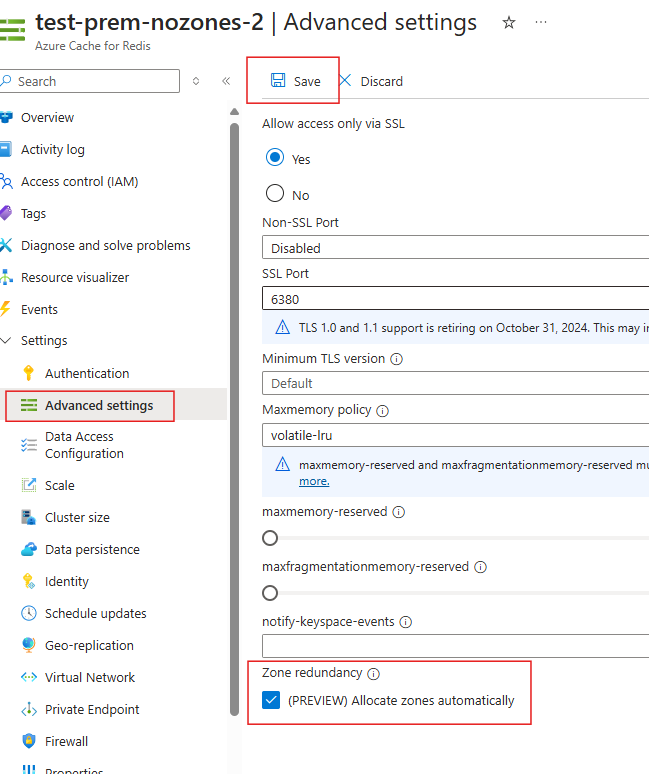Migrate an Azure Cache for Redis instance to availability zone support
This guide describes how to migrate your Azure Cache for Redis instance from non-availability zone support to availability zone support.
Azure Cache for Redis supports zone redundancy in its Standard, Premium, Enterprise, and Enterprise Flash tiers. A zone-redundant cache runs on VMs spread across multiple availability zone to provide high resilience and availability.
Note
Converting an existing resource from non-availability zone support to availability zone support is available for Standard and Premium tier caches. Enterprise and Enterprise Flash tier caches are created to be zonal by default.
Enabling Zone Redundancy for Enterprise, and Enterprise Flash tiers
Currently, the only way to convert an enterprise / enterprise flash resource from non-availability zone support to availability zone support is to redeploy your current cache.
Prerequisites
To migrate to availability zone support, you must have an Azure Cache for Redis resource in either the Enterprise, or Enterprise Flash tiers.
Downtime requirements
There are multiple ways to migrate data to a new cache. Many of them require some downtime.
Migration guidance: redeployment
When to use redeployment
Azure Cache for Redis currently doesn’t allow adding availability zone support to an existing enterprise / enterprise flash cache. The best way to convert a non-zone redundant cache to a zone redundant cache is to deploy a new cache using the availability zone configuration you need, and then migrate your data from the current cache to the new cache.
Redeployment considerations
Running multiple caches simultaneously as you convert your data to the new cache creates extra expenses.
How to redeploy
To create a new zone redundant cache that meets your requirements, follow the steps in Enable zone redundancy for Azure Cache for Redis.
Tip
To ease the migration process, it's recommended that you create the cache to use the same tier, SKU, and region as your current cache.
Migrate your data from the current cache to the new zone redundant cache. To learn the most common ways to migrate based on your requirements and constraints, see Cache migration guide - Migration options.
Configure your application to point to the new zone redundant cache
Delete your old cache
Enabling Zone Redundancy for Standard and Premium tiers
Updating an existing Standard or Premium cache to use zone redundancy is supported in-place. Users can enable it by navigating to the Advanced settings on the Resource menu and selecting Allocate Zones automatically check-box followed by the save button.
Users can't disable zone redundancy once it's enabled.

This update can also be done by passing ZonalAllocationPolicy as Automatic in the request body while updating the cache using REST API. For more information regarding the update process using REST API, see Update - ZonalAllocationPolicy.
Updating ZonalAllocationPolicy to any other value than Automatic isn't supported.
Important
Automatic Zonal Allocation cannot be modified once enabled for a cache.
Important
Enabling Automatic Zonal Allocation for an existing cache (which is created with a different zonal allocation) is currently NOT supported for Geo Replicated caches or caches with VNet injection.
Next Steps
Learn more about: